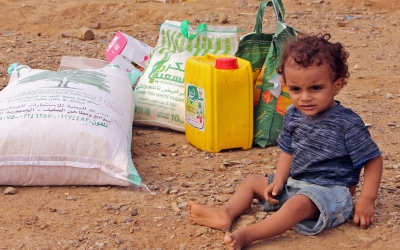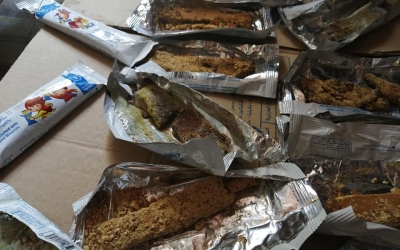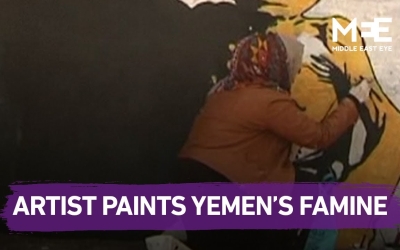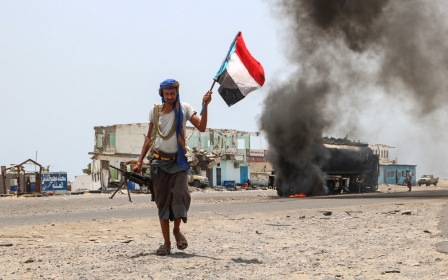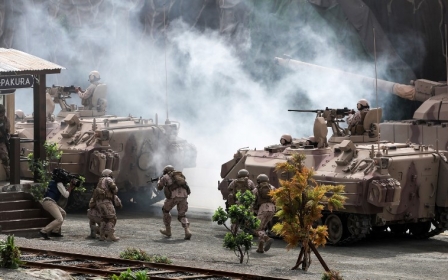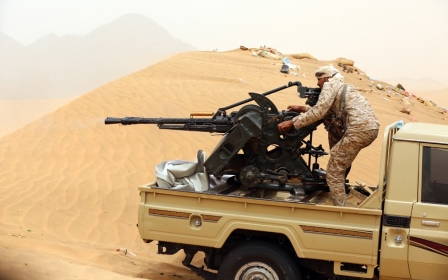Row over humanitarian aid cracks open divisions in Yemen's Houthis

A since-abandoned threat by a Houthi agency to impose taxes on humanitarian aid has sparked rare internal strife in Yemen’s main rebel movement.
Last month, Houthi aid body the Supreme Council for the Management and Coordination of Humanitarian Affairs (SCMCHA) pushed a proposed 2 percent levy on humanitarian agencies. On 14 February, the United Nations announced that the Houthis had dropped the idea - but the very suggestion has sparked controversy.
SCMCHA is run by Ahmed Hamid, a senior Houthi political figure who also serves as the director of the Houthi political bureau and overlooks the group’s media outlet, Al-Masirah TV.
When SCMCHA issued its threat, another Houthi leader, Yahia Badreddin al-Houthi, turned against the council and its chairman.
Yahia Houthi, who serves as minister of education in Houthi-held areas, is also the brother of the rebel group’s top leader, Abdelmalek al-Houthi.
Yahia Houthi dismissed SCMCHA and its chairman Hamid as “illegitimate”, and accused them of complicity in corrupt management of UN aid in the war-torn country.
“The council has not completed its legal structure and did not get support from the leader of the revolution [Abdelmalek al-Houthi],” Houthi said in a statement published on his ministry’s website on 10 February.
He added that Hamid “insists on” maintaining the council as an official body, despite opposition by other leaders in the group that controls the capital Sanaa and swathes of northern Yemen.
He went on to accuse “the so-called council” of leading a media campaign against international aid organisations mainly based on rumours rather than facts. Meanwhile SCMCHA, he claimed, was behind several scandals regarding the distribution of aid.
“We are convinced that most of the rotten food was due to the delay or prevention of distribution by some Yemeni officials, and brothers in the council have not backed up their allegations that the rotten food came from the UN’s World Food Programme,” Houthi said.
Houthi’s statement prompted Hamid to reverse the decision last week.
It was not immediately clear whether the statement reflected a serious split in the Houthi administration, based in the Yemeni capital.
An estimated 80 percent of the Yemeni population - 24 million people - require some form of humanitarian or protection assistance, including 14.3 million who are in acute need, according to UNOCHA.
Support for Yahia Houthi
Yahia Houthi spent eight years outside Yemen, mostly in Germany, and returned to Yemen when the Houthis took over the capital Sanaa and other provinces in 2015.
His outburst has led some Yemenis to express support for the senior rebel official’s move against the SCMCHA council.
Omar, 45, used to work as a driver in Sanaa but since he lost his job, he has relied on international aid to feed his six family members.
“We depend on aid to get enough food; when WFP stopped aid distribution in June, we were severely affected,” he told MEE.
The WFP suspended its aid distribution in the capital Sanaa in June 2019, and then resumed it in August after disagreements with the Houthis over the lists of beneficiaries.
“We worried to hear about another possible suspension of aid, but we were relieved after the agreement between the Houthi administration and the UN last week,” he said.
“We hope that authorities facilitate the work of organisations to help us; we do not want officials to create obstacles for humanitarian work.”
A Houthi official working closely with Yahia Houthi at the Ministry of Education in Sanaa hailed him as “a civilised leader”.
The official, who requested anonymity, told Middle East Eye that he hoped to see his superior in charge of managing international aid.
“As an educated person, Yahia is aware of the importance of aid during this difficult situation, and he does his best to facilitate the work of organisations,” the official said
International aid agencies criticised
Yemenis have previously accused international aid organisations of distributing rotten food or even using their pictures in the media without regard for their privacy.
Ali*, a Yemeni official at the tax authority in Sanaa, expressed support for the Houthi aid body SCMCHA as an umbrella organisation for managing foreign aid.
“The management of SCMCHA knows more than us about the work of aid organisations, how to support them to do the right work, and when to stop them when they violate regulations,” he told MEE.
Ali added that any mistakes committed by the council should be investigated internally rather than in the media.
“We respect the minister of education and his opinion, but that does not mean the SCMCHA did something wrong,” he opined.
“The SCMCHA did not ask organisations to pay taxes,” he added. “It merely needed to cover its operational expenses to be able to carry out its work.”
Contrary to accusations against the council, Ali said he believed it was in fact fighting the corruption of international aid groups.
“Organisations exploit the need of people to provide them with rotten food but SCMCHA works hard to stop this.”
Ali added that international aid agencies taking photos of needy people during the distribution of food amounted to “exploitation”.
“Those needy people may accept to be photographed, but maybe after a few years they won’t be hungry anymore - but their photos will remain in the media as photos of hungry people.”
“We do not want our brothers to lose their dignity for the sake of food,” he said.
While it remains unclear what long-term ramifications of SCMCHA’s aborted tax may yet have, they have uncovered internal tensions within Houthi leadership, while further highlighting the sensitivities surrounding humanitarian aid as Yemen approaches five years of devastating armed conflict.
*Name changed for security concerns.
Middle East Eye delivers independent and unrivalled coverage and analysis of the Middle East, North Africa and beyond. To learn more about republishing this content and the associated fees, please fill out this form. More about MEE can be found here.


